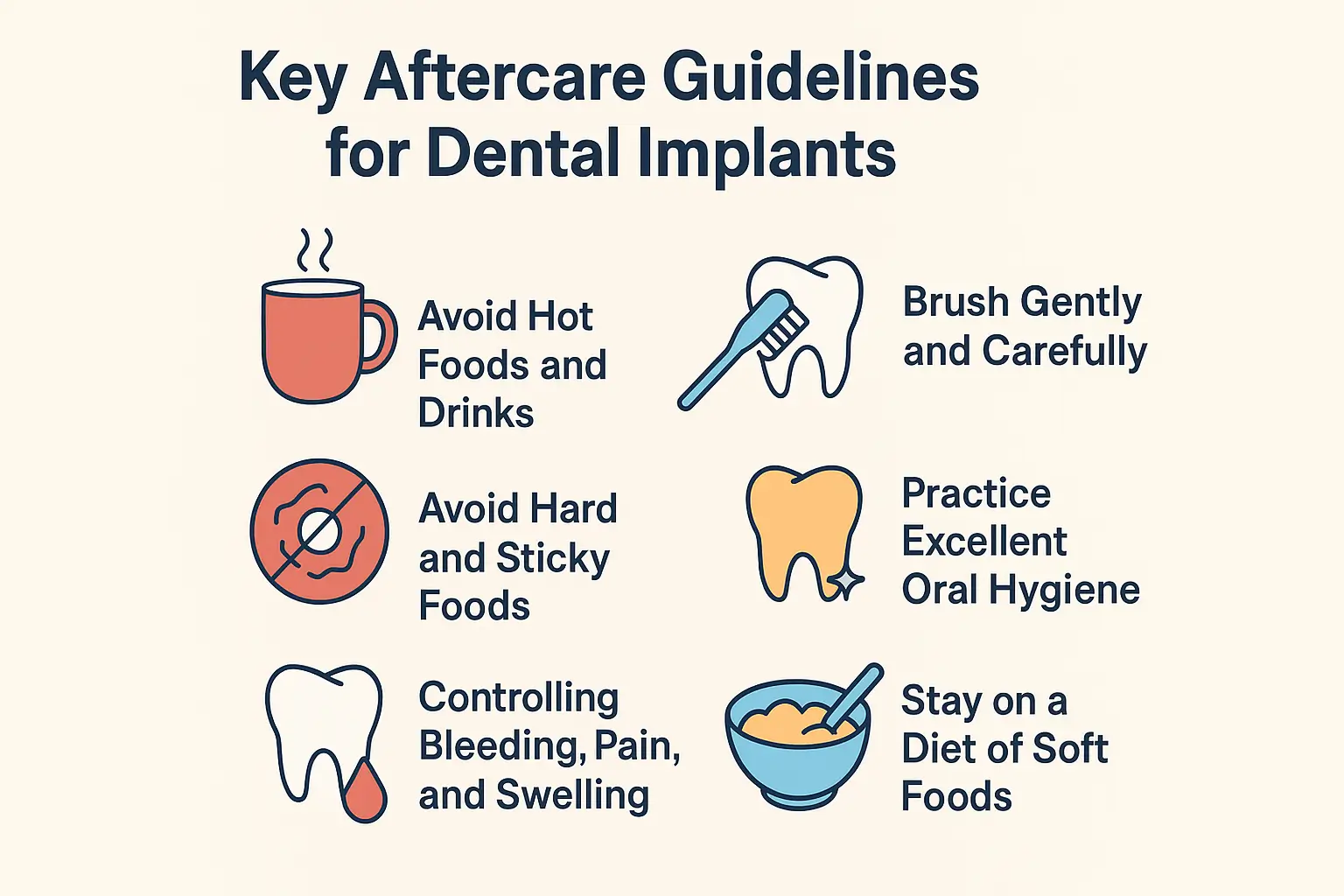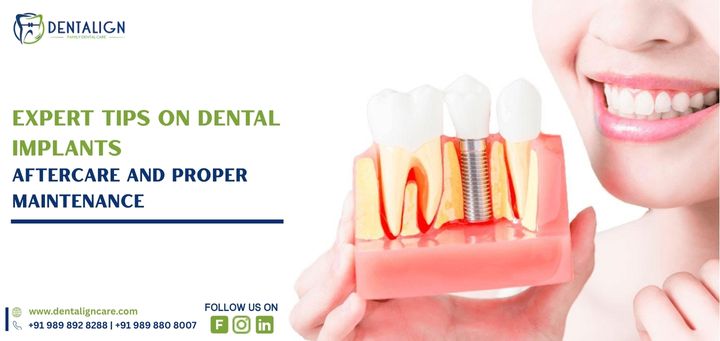Dental implant treatment is a delicate procedure that requires precision and proper healing. During the procedure, the artificial root is placed into the jawbone, where it gradually integrates with the surrounding bone and becomes stable. For this integration process to be successful, the surrounding gum tissues and bone must heal correctly and remain free from irritation.
If proper care is not followed during recovery, it may result in infection, gum inflammation, delayed healing, or complications that affect stability. In some cases, neglecting aftercare can even lead to failure of the restoration if problems are not detected early.
During the healing phase, patients who follow professional aftercare guidance generally experience smoother recovery and better long-term outcomes. This guide provides essential aftercare instructions and maintenance tips to support healing and help you maintain a healthy, confident smile for years to come.
Why Is Aftercare Important for Dental Implants?
Dental implant surgery is critical. The surgical placement of an artificial root requires careful attention during healing. Once positioned in the jawbone, the area must undergo a natural bonding process that allows the structure to become secure. The surrounding gum tissue and bone need time to recover before full strength and stability are achieved.
Ignoring care recommendations can lead to irritation, swelling, infection, or delayed healing. Proper maintenance ensures the treated area remains stable and allows your full dental implants to function comfortably and naturally, similar to real teeth.
Key Aftercare Guidelines for Dental Implants

Following professional advice during the early healing phase plays a crucial role in recovery. Below are key recommendations to support comfort and proper healing in the days following the procedure.
1. Avoid Very Hot Foods and Drinks
The treated area remains sensitive for several days. Consuming very hot beverages such as tea or coffee may cause irritation and slow healing. Choose lukewarm or cold foods initially to reduce discomfort and protect the surgical site.
2. Gentle Brushing Routine
Your gums may feel tender for a few days. Brushing too hard can cause bleeding or discomfort. Use a soft-bristled toothbrush after a dental implant treatment and avoid direct contact with the treated area until your dentist advises otherwise. Once healing begins, clean gently around the site to maintain hygiene.
3. Avoid Hard or Sticky Foods
Chewy candies, hard fruits, or nuts can place unnecessary pressure on the healing area. This may lead to discomfort and slow recovery. Soft foods such as soups, yogurt, mashed vegetables, and scrambled eggs are recommended until your dentist allows a regular diet.
4. Maintain Excellent Oral Hygiene
Although artificial teeth are not affected by decay, the surrounding gums and bone still require proper care. Food particles and plaque can accumulate around the site and may cause inflammation.
Helpful oral hygiene tips include:
Rinse with lukewarm salt water after meals
Avoid alcohol-based mouthwash during early healing
Floss daily using recommended tools to clean hard-to-reach areas
5. Managing Bleeding, Pain, and Swelling
Bleeding:
Mild bleeding is normal within the first 24–48 hours. Bite gently on clean gauze for 20 minutes if needed. If bleeding continues, contact your dentist.
Pain:
Some discomfort is expected after the procedure. Use the prescribed medication or pain relief recommended by your dentist.
Swelling:
Apply a cold compress for 10–15 minutes at a time during the first two days to reduce swelling and improve comfort.
6. Stay on a Diet of Soft Foods
A soft diet is recommended during the initial healing period. Avoid extremely hot, spicy, or acidic foods that may irritate tissues. If bone grafting has been performed, extended care may be required. With proper consideration of dental implants, recovery can remain smooth and comfortable.
Long-Term Maintenance of a Dental Implant
Once healing is complete, long-term maintenance becomes simple and manageable. Establishing consistent habits helps maintain stability and ensures long-lasting results.
- Brush twice daily using a soft toothbrush and gentle toothpaste
- Floss daily or use interdental brushes for thorough cleaning
- Rinse with antibacterial solutions if recommended
- Avoid smoking, as it can delay healing and affect gum health
- Limit alcohol intake to support bone and gum health
- Visit your dentist regularly for a professional evaluation
Routine dental check-ups every three to six months help ensure your oral health remains in good condition and functioning comfortably.
Dos & Don’ts after Dental Implants
Dos
- Follow all aftercare instructions carefully
- Eat nutritious, soft foods during recovery
- Take prescribed medication on time
- Apply cold packs to reduce swelling
- Keep the mouth clean with gentle brushing and rinsing
Don’ts
- Avoid smoking and alcohol
- Do not touch or poke the surgical area
- Avoid aggressive brushing near the site
- Skip heavy exercise for at least 48 hours
- Avoid hard, sticky, or extremely hot foods initially
Supporting Long-Term Oral Health
Proper care does more than protect the treated area. It also supports overall oral health and comfort. Maintaining strong hygiene habits helps prevent gum disease, reduces plaque buildup, and keeps surrounding teeth healthy. Regular professional cleanings and evaluations allow early detection of any concerns.
With consistent maintenance, artificial tooth replacements can last for many years and provide excellent comfort and stability. Many patients find that once healing is complete, daily care becomes similar to maintaining natural teeth.
Final Thoughts
Dental implant treatment offers a reliable and long-lasting way to restore both appearance and chewing ability. Success depends greatly on how well aftercare instructions are followed. Maintaining good hygiene, attending regular check-ups, and protecting the healing area all contribute to long-term stability.
If you are exploring options or want guidance on maintaining your new smile, professional support is essential. When considering restoration solutions in Ahmedabad, speaking with experienced professionals helps you understand each stage clearly and confidently.
For personalised guidance and expert support, reach out today and schedule your appointment to begin your journey toward a healthier and brighter smile.
FAQ
-
How long is the recovery for dental implants?
Healing usually takes between three and six months, depending on overall health, bone condition, and whether additional procedures such as grafting were required.
-
Can I brush my teeth after surgery?
Yes, but avoid direct brushing over the treated area for a few days. Use a soft brush and follow your dentist’s guidance.
-
How often should check-ups be scheduled?
Most patients benefit from professional evaluations every three to six months to ensure long-term stability and comfort.
-
Can food get trapped around the area?
Yes, similar to natural teeth. Regular flossing and rinsing help keep the area clean and healthy.
-
Do artificial teeth require special care?
They can be maintained like natural teeth, but extra attention to hygiene and gum care is recommended.
-
How can healing be supported?
Follow hygiene instructions, maintain a balanced diet, avoid smoking, and attend all follow-up visits to support smooth recovery.

